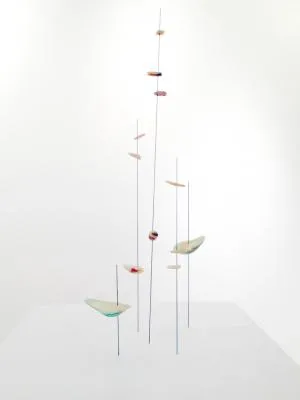
Bush Barn Art Center in Salem, Oregon presents, "Contemporary Abstraction" a group show exploring different approaches to contemporary, abstract art through the work of three Northwestern artists Ellen George (sculpture), Julia Bradshaw (photography), and Elizabeth Magee (painting).
May 6-June 24
Reception: Friday, May 5 | 5:30-7:30 pm
Bush Barn Art Center | 600 Mission St. SE Salem
Abstraction is a departure from depicting reality in art. It explores the relationships of forms, colors, and ideas. From the Renaissance (14th-17th century) up to the origin of Modern Art (mid-19th century) artists were content with rendering the world into imagery that was easily understood. However, by the end of the 19th century many artists felt a need to create “a new kind of art” in response to innovations taking place in technology, science and philosophy. Sources from which artists drew their inspirations were diverse and reflected an intellectual fascination in all areas of culture. How artists create, how we experience art, and how we incorporate art into our lives were all reimagined through abstraction.
This exhibition explores three distinctive approaches to contemporary abstraction through the work of Julia Bradshaw (photography), Ellen George (sculpture), and Elizabeth Magee (painting).
Julia Bradshaw creates topographical landscapes and geometric shapes from source-photographs that refer to the fore-edges and top-edges of paperback books. She utilizes a variety of photographic techniques, from historical darkroom techniques to current computer-based photographic imaging.
Ellen George is an American-born first generation Chinese artist. Born on Galveston Island, among her earliest memories are visions of tiny aquatic life, teeming in drops of Gulf water, collected and seen under the microscope in her parent’s laboratory. The movement, clustering, translucency, and shift of scale, of these microscopic animals and plants continue to influence and inform her work to this day.
Elizabeth Magee’s paintings exist between culture and nature. By engaging with the histories of painting without strategizing an end game, she can interrogate, choose and reinvent — avoiding a signature style.
When looking at any artwork, the first question tends to be “What is this about?” Though that is a good place to start, it will not always apply looking at an abstract work — unless we are willing to think more creatively. Abstract artwork can be “about” the paint on the canvas; it can be “about” the process of painting for an artist personally; it can even be about the meaning and philosophy of art itself. Consider: “What does it prompt you to think about? When presented with a particular color or shape, how does what you’re looking at make you feel?” Begin with asking yourself these kinds of questions and abstract art becomes less mysterious.
Salem Art Association exhibitions are free and open to the public. Gallery hours are Tuesday-Friday from 10 am-5 pm, and Saturday-Sunday from Noon-5 pm.